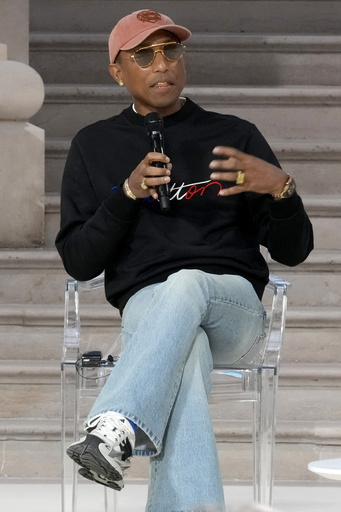
PARIS — On Tuesday, Vice President JD Vance of the United States issued a cautionary message to international leaders and technology industry figures, highlighting that “excessive regulation” could hinder the growth of the burgeoning artificial intelligence sector. This statement comes as a critique of European initiatives aimed at managing the risks associated with AI technologies.
The remarks emphasized the increasingly distinct perspectives surrounding the evolution of AI technology; a divergence that critics fear could either facilitate significant advancements for humanity or lead to adverse outcomes. The U.S. administration, under the leadership of President Donald Trump, is advocating for a laissez-faire strategy designed to spur innovation. In contrast, European nations are imposing stricter regulations to prioritize safety and accountability. Meanwhile, China is aggressively advancing its AI capabilities through government-backed tech companies, aiming for leadership in the global AI arena.
Notably, the U.S. was not part of an international agreement, endorsed by over 60 countries — including China — which committed to promoting responsible AI development. The United Kingdom also opted out of this pledge.
Vance’s remarks marked his inaugural major policy address since assuming the vice presidency last month. In his speech, he characterized AI as a pivotal economic milestone, expressing that, “At this moment, we face the extraordinary prospect of a new industrial revolution, one comparable to the steam engine.” He further warned that an overabundance of regulations could dissuade innovators, stating, “This future will not materialize if overregulation deters innovators from taking the necessary risks.”
The vice president, now 40, is leveraging his podium at the AI summit, as well as an impending security conference in Munich, to project a bold style of diplomacy aligned with the Trump administration’s objectives. Vance assured that AI developments in the U.S. would remain free from ideological bias and emphasized that the government would uphold citizens’ rights to free speech.
The global commitment document that was signed by numerous countries, including European nations, emphasized the importance of making AI accessible to bridge digital divides. Additionally, it highlighted the need for AI systems to be open, inclusive, transparent, ethical, and secure, while also championing sustainability in AI practices and protecting fundamental rights.
In an unexpected development, China — a nation often criticized for its human rights policies — signed this declaration, illustrating an even wider gap between the U.S. and other global players in the quest for AI leadership. The UK also refrained from signing, largely due to concerns about insufficient clarity on global governance, as indicated by a spokesperson for Prime Minister Keir Starmer.
Vance criticized foreign nations for “tightening the screws” on American technology companies, underscoring the divide between Washington and its European partners regarding AI governance. This discourse occurs in the context of the European Union’s AI Act, the first of its kind globally, which began enforcement this past August.
European Commission President Ursula von der Leyen emphasized the necessity for AI technologies to gain public trust and ensure safety while sharing plans to standardize regulations, even as concerns over regulatory burdens persist. She also revealed that the “InvestAI” initiative successfully amassed €200 billion in AI investments throughout Europe, which includes a specific allocation of €20 billion for AI gigafactories.
The summit highlighted a significant power struggle in the realm of AI — where Europe advocates for robust regulations and public funding, China expands its government-backed AI initiatives, and the U.S. leans towards a free-market philosophy. French President Emmanuel Macron proposed that Europe provide a “third way,” balancing regulatory measures without stifling innovation or overly depending on the U.S. or China.
While advocating for equitable access to innovations globally, Macron acknowledged fresh investments to enhance Europe’s standing in the AI landscape, stating, “We’re in the race.” In contrast, China adopts a dual approach: exerting control domestically while championing open-source AI globally.
Chinese Vice Premier Zhang Guoqing spoke on behalf of President Xi Jinping, expressing China’s intention to influence global AI standards, while simultaneously criticizing Western restrictions on AI access. Despite China’s assertions that open-source AI would be widely beneficial, critics argue it serves to extend Beijing’s influence.
Amid the ongoing tensions between the U.S. and Europe concerning AI, Vance, who has openly questioned European tech regulations, suggested the U.S. might reassess its NATO commitments if Europe tightens its grip on Elon Musk’s platform, X. His visit to Paris also encompassed discussions regarding the conflict in Ukraine, the escalating significance of AI in global dynamics, and tensions with China.
As discussions around the regulation of AI continue to evolve, concerns about its potential threats were prominent during the summit, especially as nations contemplate how to manage technologies that are increasingly linked to defense and warfare. Admiral Pierre Vandier, overseeing NATO’s modernization efforts, observed that controlling AI might become imperative to prevent losing command over broader issues.
Amid diplomatic disputes, a global initiative known as “Current AI” is being formed to promote collaboration between private and public sectors in large-scale AI projects geared towards the public good. Experts view this as a step toward countering the influence of private companies in AI innovation, although it remains uncertain whether the U.S. will back such initiatives.
In the competitive landscape of AI, a significant showdown is underway within the private sector as well. A coalition of investors led by Musk, now heading the Department of Government Efficiency, has put forth a proposal to acquire the nonprofit organization behind OpenAI for $97.4 billion. However, OpenAI’s CEO, Sam Altman, who attended the Paris summit, made it clear that the organization is “not for sale.”
When questioned about AI regulation, Altman downplayed the necessity for increased restrictions in Europe. Nevertheless, Dario Amodei, CEO of Anthropic — a rival to OpenAI — criticized the summit as a “missed opportunity” to thoroughly address the urgent challenges posed by the expanding technology. He put forth that issues surrounding the leadership of democracies, AI-related risks, and the impending economic shifts should be key points of discussion in future summits.

